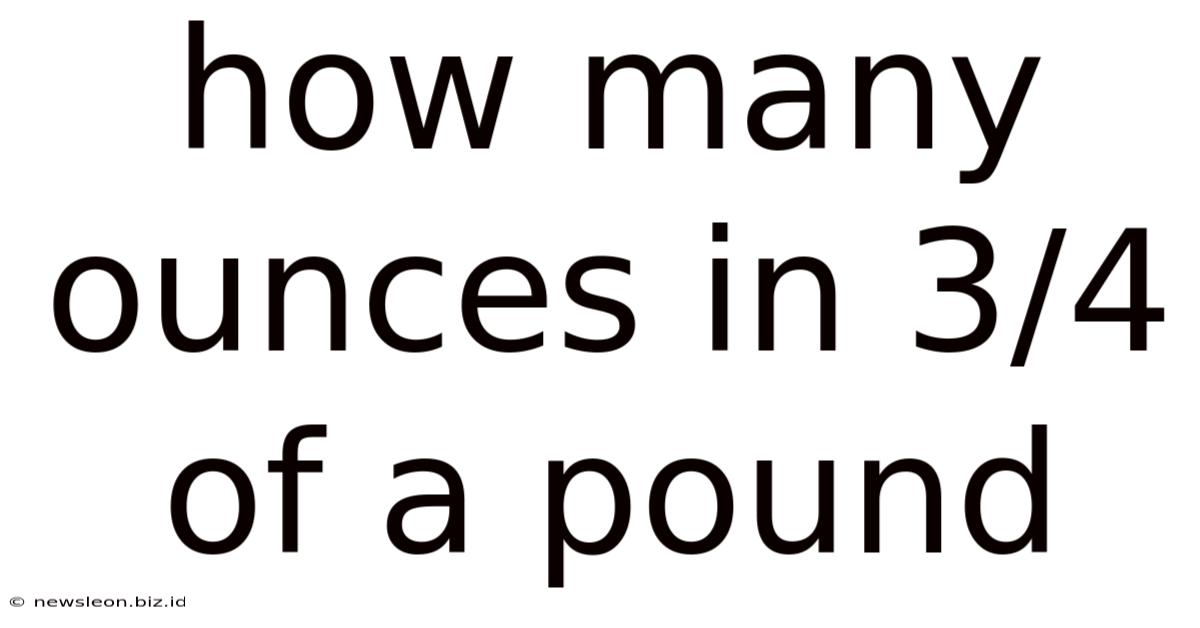How Many Ounces In 3/4 Of A Pound
News Leon
May 04, 2025 · 4 min read

Table of Contents
How Many Ounces are in 3/4 of a Pound? A Comprehensive Guide
Knowing how to convert units of weight is a fundamental skill with applications spanning various aspects of daily life, from cooking and baking to crafting and even scientific endeavors. This comprehensive guide delves into the question, "How many ounces are in ¾ of a pound?" We'll not only answer this specific question but also equip you with a solid understanding of weight conversions and related concepts.
Understanding the Basics: Pounds and Ounces
Before diving into the calculation, let's establish the foundational relationship between pounds and ounces. The imperial system of measurement, commonly used in the United States, defines:
- 1 pound (lb) = 16 ounces (oz)
This conversion factor is crucial for all weight conversions involving pounds and ounces. Remember this key relationship, and you'll be well on your way to mastering these conversions.
Calculating Ounces in ¾ of a Pound
Now, let's address the core question: How many ounces are in ¾ of a pound?
To solve this, we simply apply the conversion factor we just learned:
-
Identify the fraction: We are working with ¾ of a pound.
-
Apply the conversion factor: Since 1 pound equals 16 ounces, we can set up a simple equation:
(¾ lb) * (16 oz/1 lb) = ? oz
-
Perform the calculation: The "lb" units cancel out, leaving us with:
(¾) * 16 oz = 12 oz
Therefore, there are 12 ounces in ¾ of a pound.
Practical Applications and Real-World Examples
Understanding this conversion isn't just about solving math problems; it has numerous practical applications in everyday life. Consider these examples:
-
Cooking and Baking: Recipes often list ingredients in both pounds and ounces. Understanding the conversion is essential for accurate measurements and consistent results. Imagine a recipe calling for ¾ lb of flour – now you know that's equivalent to 12 ounces.
-
Shipping and Packaging: Shipping costs are frequently calculated based on weight. Knowing how to convert between pounds and ounces allows for accurate calculations of shipping fees.
-
Crafting and DIY Projects: Many crafting projects require precise measurements of materials. Whether you're working with clay, beads, or yarn, understanding weight conversions ensures accuracy and avoids wasted materials.
-
Science and Engineering: In various scientific and engineering fields, precise measurements are paramount. Converting between pounds and ounces is crucial for accurate data recording and analysis.
Expanding Your Knowledge: Other Weight Conversions
While we've focused on pounds and ounces, the broader context of weight conversion involves other units as well. Let's explore some related conversions:
Pounds to Grams
The metric system uses grams as its base unit of mass. The conversion factor is:
- 1 pound (lb) ≈ 453.592 grams (g)
This conversion is particularly useful when working with international recipes or scientific data.
Ounces to Grams
Similar to the previous conversion, ounces can also be converted to grams:
- 1 ounce (oz) ≈ 28.3495 grams (g)
Kilograms to Pounds
Kilograms (kg) are a larger unit in the metric system. The conversion factor is:
- 1 kilogram (kg) ≈ 2.20462 pounds (lb)
Grams to Ounces
Converting grams to ounces is simply the reverse of the ounce-to-gram conversion:
- 1 gram (g) ≈ 0.035274 ounces (oz)
Mastering Weight Conversions: Tips and Tricks
Here are some helpful tips for mastering weight conversions:
-
Memorize key conversion factors: Start by memorizing the fundamental conversions, such as 1 lb = 16 oz. This forms the foundation for all other conversions.
-
Use online converters: Numerous online converters are available for quick and easy conversions between different weight units. These can be helpful for double-checking your calculations.
-
Practice regularly: The more you practice, the more comfortable you'll become with these conversions. Try working through different examples to build your skills.
-
Understand the context: Pay close attention to the units involved in the problem. Make sure you are converting the correct units.
-
Check your work: Always double-check your calculations to ensure accuracy. A small mistake in conversion can have significant consequences in certain applications.
Beyond the Basics: Understanding Weight vs. Mass
While we've discussed weight conversions, it's important to note the distinction between weight and mass. Mass is a measure of the amount of matter in an object, while weight is a measure of the force of gravity acting on that object. Weight can vary depending on the gravitational field (for example, your weight on the moon is different than on Earth), whereas mass remains constant. However, in everyday life, the terms are often used interchangeably, especially when dealing with relatively small differences in gravitational pull.
Conclusion
This comprehensive guide has provided a clear and detailed explanation of how to determine the number of ounces in ¾ of a pound, along with broader insights into weight conversions and their real-world applications. By mastering these fundamental conversions, you'll be better equipped to tackle various tasks in cooking, baking, crafting, shipping, and numerous other fields. Remember the key conversion factor – 1 pound equals 16 ounces – and practice regularly to build confidence and accuracy in your calculations. This knowledge empowers you to work with precision and accuracy across various contexts. Happy converting!
Latest Posts
Related Post
Thank you for visiting our website which covers about How Many Ounces In 3/4 Of A Pound . We hope the information provided has been useful to you. Feel free to contact us if you have any questions or need further assistance. See you next time and don't miss to bookmark.